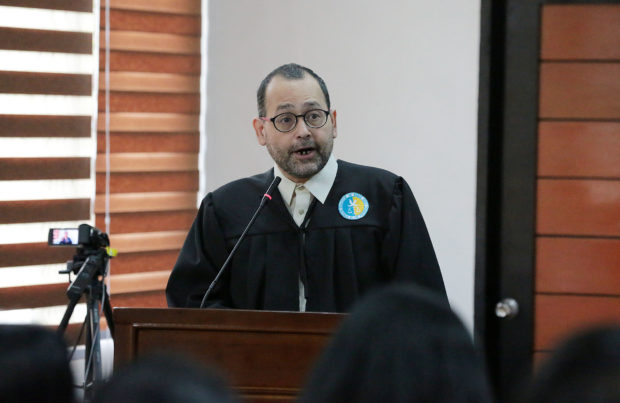CHR pushes for moves to prevent torture, cruel treatment of inmates

CHR Chairman Jose Luis Martin “Chito” Gascon (File photo by GRIG C. MONTEGRANDE / Philippine Daily Inquirer)
MANILA, Philippines – The Commission on Human Rights (CHR) is insisting the creation of measures that would prevent torture and other cruel treatment of persons deprived of liberty (PLDs), asking government agencies to allow them to check on people in detention facilities.
During the Interim National Preventive Mechanism (INPM) Summit Against Torture on Tuesday, the CHR also got the support of various law enforcement agencies like the Philippine National Police (PNP), Armed Forces of the Philippines (AFP), Bureau of Jail Management and Penology (BJMP), which signed a declaration of commitment to CHR’s initiatives.
According to CHR Chairperson Chito Gascon, this step is important as committing to the INPM — a temporarily-installed protocol — ensures that the government is willing to prevent torture while legislation is still pending.
He also noted that this differs from Republic Act 9745 or the Anti Torture Act.
“Una kasi ‘yong Anti-Torture law criminalized torture, and so therefore it’s a crime that is punishable under our penal statute. ‘Yong NPM, mechanism or procedure mandated by the optional protocol na ang approach is non-accusatory, preventative,” Gascon said in an ambush interview after the event.
Article continues after this advertisement“In other words to allow visits to places of detentions, not just jails or prison. Kun’di any place where there is potential deprivation of liberty, to look at the conditions in those places of detention, to ensure that torture doesn’t occur,” he added.
Article continues after this advertisementGascon also explained that the creation of NPM is mandated by the United Nations (UN) Convention against Torture and Other Cruel, Inhuman or Degrading Treatment or Punishment, which the Philippines is a state party to.
However, he stressed that the passage of R.A. 9745 10 years ago did not mean the country already complied with its requirements.
“Posible ang baka mangyari nga kasi 10 years na ring napasa ‘yong batas ‘pagka mag-establish ng NPM, kailangan tignan ‘yong batas. Kasi ‘yong batas created the oversight committee against torture, na executive, legislative, at Commission on Human Rights,” Gascon said when asked if there is a need for a new law.
“Pero ‘yong oversight committee, hindi po ‘yan NPM, na nakalagay sa treaty. Ang treaty body na ang nagsabi na we are not compliant. So ‘yong pagpasa ng batas did not comply with the treaty obligation,” he added.
Torture has been a been a controversial topic in the Philippine political setting, with countless tales of law enforcers using disallowed methods just to forcibly obtain information from a person. In the past, several allegations of torture have been thrown against AFP and PNP.
In 2015, there were 43 health workers arrested in Morong, Rizal, over claims by the military that they were attending a gun-making program in a resort, supposedly endorsed by communist rebels. CHR ruled that the “Morong 43” were tortured by military officials.
Other accusations of torture have been raised by members of activist groups, who claimed that their members have been forcibly taken by military officials.
READ: ‘She was tortured,’ claims mother of NPA leader slain in Tagum City
Still, Gascon clarified that torture does not only refer to physical and psychological harm against suspects and persons in custody.
“So that (preventing torture also) means improvement of the facilities, reduction of the congestion, and regular consultations with the administrators in these places of detention,” he said. /jpv